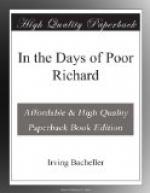Doctor Franklin went that day to the meeting of the Privy Council, whither he had been sternly summoned for examination in the matter of the letters of Hutchinson et al. For an hour he had stood unmoved while Alexander Wedderburn, the wittiest barrister in the kingdom, poured upon him a torrent of abuse. Even the Judges, against all traditions of decorum in the high courts of Britain, laughed at the cleverness of the assault. That was the speech of which Charles James Fox declared that it was the most expensive bit of oratory which had been heard in England since it had cost the kingdom its colonies.
It was alleged that in some manner Franklin had stolen the letters and violated their sacred privacy. It is known now that an English nobleman had put them in his hands to read and that he was in no way responsible for their publication. The truth, if it could have been told, would have bent the proud heads of Wedderburn and the judges to whom he appealed, in confusion. But Franklin held his peace, as a man of honor was bound to do. He stood erect and dignified with a face like one carved in wood.
The counsel for the colonies made a weak defense. The triumph was complete. The venerable man was convicted of conduct inconsistent with the character of a gentleman and deprived of his office as Postmaster General of the Colonies.
But he had two friends in court. They were the Lady Hare and her daughter. They followed him out of the chamber. In the great hallway, Margaret, her eyes wet with tears, embraced and kissed the philosopher.
“I want you to know that I am your friend, and that I love America,” she said.
“My daughter, it has been a hard hour, but I am sixty-eight years old and have learned many things,” he answered. “Time is the only avenger I need. It will lay the dust.”
The girl embraced and kissed him again and said in a voice shaking with emotion:
“I wish my father and all Englishmen to know that I am your friend and that I have a love that can not be turned aside or destroyed and that I will have my right as a human being.”
“Come let us go and talk together—we three,” he proposed.
They took a cab and drove away.
“You will think all this a singular proceeding,” Lady Hare remarked. “I must tell you that rebellion has started in our home. Its peace is quite destroyed. Margaret has declared her right to the use of her own mind.”
“Well, if she is to use any mind it will have to be that one,” Franklin answered. “I do not see why women should not be entitled to use their minds as well as their hands and feet.”
“I was kept at home yesterday by force,” said Margaret. “Every door locked and guarded! It was brutal tyranny.”
“The poor child has my sympathy but what can I do?” Lady Hare inquired.
“Being an American, you can expect but one answer from me,” said the philosopher. “To us tyranny in home or state is intolerable. They tried it on me when I was a boy and I ran away.”




